Disability Inclusive National Budget 2022-23
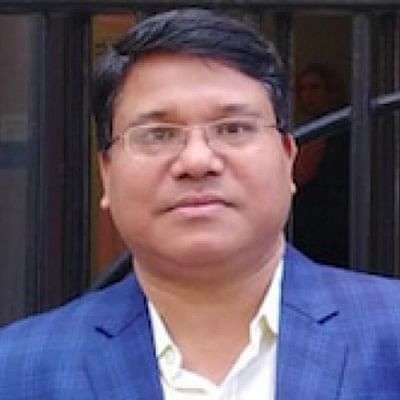
Albert Mollah, Co-Founder & Executive Director, Access Bangladesh Foundation & Moderator of the Session
Access Bangladesh Foundation has been campaigning since 2014 and advocating to make the national budget disability-inclusive. In continuation of this effort, we are holding today's roundtable with the support of Manusher Jonno Foundation and UKaid. This year we are organising the discussion earlier so that the policymakers have enough time to take our recommendations into consideration. We don't have any reliable data on the number of persons with disabilities in Bangladesh. Determining their exact number is crucial to ensure their inclusion in all the development plans.
Currently, the government allocates only 0.37 percent of the national budget for the persons with disabilities. They get only 2.07 percent of the safety net budget. The safety net programmes are also not disability-inclusive since only 8 programmes out of 120 safety net initiatives are focused on the welfare of persons with disabilities.
We have several national and international instruments on the rights of persons with disabilities. However, we are seriously lagging behind in terms of effective implementation of these legal instruments.
Although persons with disabilities constitute a significant portion of the population and contribute to the development of the country, they hardly get an opportunity to participate in the decision-making processes. I would like to request the government to hold discussions every year with persons with disabilities before preparing the national budget.
Lack of awareness, inadequate infrastructure and discrimination are three major barriers to the mainstreaming of persons with disabilities in the development projects.
The government should adopt the social model to make the budget disability-inclusive. According to this model, people are disabled by barriers in society, not by their impairment or differences.
The government should follow the twin-track approach to ensure equality of rights and opportunities for persons with disabilities. On the one hand, the government has to ensure that persons with disabilities have access to basic needs in every sphere of life on an equal basis with other members of the community. On the other hand, the specific needs of persons with disabilities should be addressed to empower them.
The current allowance for persons with disabilities is the same for all forms of disabilities. The allowance should not be the same for all. This should be investigated and fixed because the severity and challenges of different types of disabilities differ. The caregivers of the persons who suffer from severe types of disabilities should also be provided with an allowance.
A special insurance scheme should be designed for persons with disabilities. This would cover the various assistive devices they may need. Additionally, the government should exempt persons with disabilities from having to pay taxes when importing such assistive devices.
Currently, one lakh students with disabilities receive a stipend, but we should ensure that 100 percent of persons with disabilities are provided a stipend, especially students. They should also be allowed to pursue vocational education if they want.
There should be specific quotas for persons with disabilities in educational institutions and workplaces. We must also ensure that workplaces are accepting and inclusive of women with disabilities.
There should be at least 10 seats for women with disabilities in the working women hostels. To ensure this the government should allocate a budget.
At present, there are no vehicles that are user-friendly for persons with disabilities. We need to address this issue immediately and provide incentives to companies so that they make vehicles that are user-friendly for persons with disabilities.
Currently, issues related to persons with disabilities are handled by the Ministry of Social Welfare (MoSW). However, I believe that participation of other relevant ministries is required here. A combined effort from multiple ministries, maybe through some sort of pilot project, could help address many of the issues faced by persons with disabilities.
The government should also fund the various Disabled People's Organizations (DPOs) to create awareness about violence against women with disabilities. In short, I would say that there should a holistic plan to integrate these people into our society.
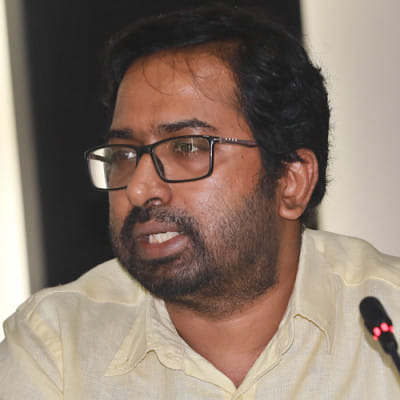
Shamsuddoza Sajen,
Commercial Supplements Editor, The Daily Star
Media has two important roles to play to improve the condition of persons with disabilities in Bangladesh promoting an accurate image of persons with disabilities and enhancing their voice.
Persons with disabilities are often portrayed in media as objects of pity and charity. The focus is more on the impairment than on the individual. The media should present disability issues in a way that dispels negative stereotypes and promotes the rights and dignity of persons with disabilities.
Persons with disabilities are under-represented both in terms of employment in the media and portrayal in the media. Their under-representation within the media workforce has implications on how they are portrayed within the media.
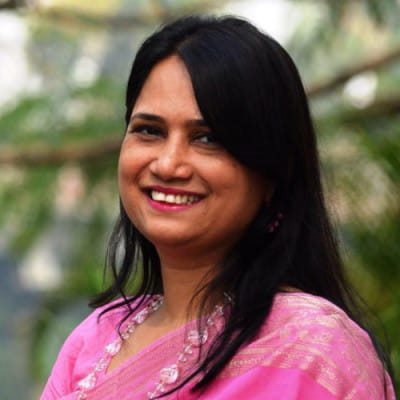
Nazrana Yesmin Hira,
Program Coordinator, Manusher Jonno Foundation
The government is trying to improve the condition of persons with disabilities. However, there are some issues that require urgent attention. Besides increasing the allocation for persons with disabilities in the budget for social safety net programmes, the government should provide these people with effective skills so that they can earn their livelihoods and contribute to the economy.
The government has provided some housing facilities to persons with disabilities. But they still face access issues. The government should pay immediate attention to such inconveniences faced by persons with disabilities.
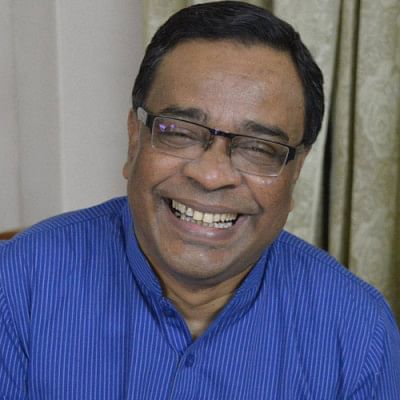
Khandaker Jahurul Alam, Executive Director, Centre for Services and Information on Disability (CSID)
Our honourable Minister of Planning noted in the 8th Five Year Plan that the inclusion of persons with disabilities in our economy would increase GDP by 3.4 percent. That is why I earnestly request all stakeholders, including different ministries, civil society and DPOs, to come forward and help make our country more disability-inclusive.
Most of the work for the inclusion of persons with disabilities is being handled by the MoSW. The MoSW has allocated 750 taka per month for a person with disability, which amounts to 25 taka per day. Now, such little allowance cannot ensure a person's wellbeing. The government should seriously consider this issue.
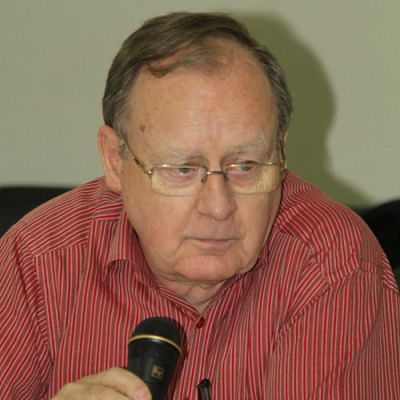
Julian Francis, Development and disability consultant
32 years ago, the Bangladesh Bureau of Statistics (BBS) estimated the percentage of persons with disabilities to be around 0.52 percent. The World Health Organisation had, at the same time, published a figure of 10 percent. There is a discrepancy on the data regarding persons with disabilities in Bangladesh, and this needs to be solved. I am happy to hear that BBS is working with organisations like Access Foundation Bangladesh to identify persons with disabilities in the upcoming census. It should be an immediate priority for us to estimate the figure for persons with disabilities. If the planning ministry does not have the correct figure, then how can they make plans to address the needs of this group? How will the finance ministry allocate the appropriate funds to address their needs?
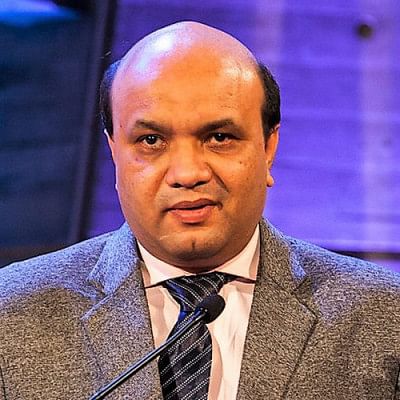
Vashkar Bhattacharjee, National Consultant, a2i
While we have made great strides on our path to becoming a digital Bangladesh, we are yet to make it fully accessible, inclusive and barrier-free for everyone. This is why it's important for the government to ensure that all the benefits of digital Bangladesh are accessible to persons with disabilities. We have made 60 to 70 percent of services accessible for persons with disabilities, but there is a lack of initiative in making all services accessible.
The multimedia talking book, which provides an audio version of textbooks, should be made accessible for persons with disabilities as soon as possible. This will make it easier for them to read school textbooks. My recommendation would be for the Ministry of Education to provide the multimedia talking book to all students with disabilities.
Persons with disabilities often rely on assistive technology or devices. However, these can be quite expensive. That is why the government should try and provide assistive technology, such as smartphones, computers, and power wheelchairs, free of cost for persons with disabilities.
Simultaneously, our prime objective should be to increase the allowance for persons with disabilities. This allowance should be provided to only those who are facing financial difficulties.
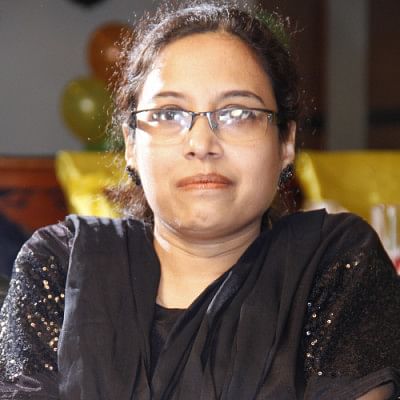
Salma Mahbub, General Secretary, Protibondhi Nagorik Shangathaner Parishad (PNSP)
Recently, we allocated quotas and provided various incentives to empower women with disabilities. These quotas and incentives can ensure that persons with disabilities do not fall behind. This is why we need to allocate a portion of our budget to continue these affirmative actions.
I believe that organisations that are working with persons with disabilities can play an important role here. They should collaborate and support the government in making our country more disability-inclusive.
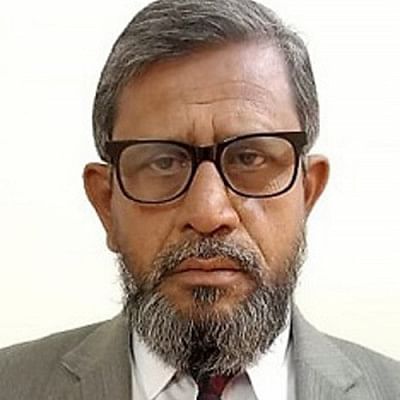
Jowaherul Islam Mamun,
Mentor, SWID Bangladesh
Schools and universities across the country are yet to be fully accessible and inclusive for persons with disabilities. Our goal should be to bring everyone under the umbrella of education. To do this, the Ministry of Primary and Mass Education should formulate a plan, which is backed by the necessary budget and resources.
The government has many departments that provide skills training for employment. The Bureau of Manpower, Employment and Training has Technical Training Centres (TTCs) and the Ministry of Youth and Sports has Youth Development Training Centres. These facilities should be made more accessible for persons with disabilities. This will help them become skilled and enter the job market.
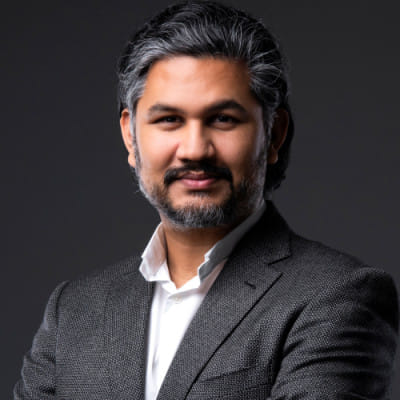
Murteza Rafi Khan,
CEO, Bangladesh Business and Disability Network
We are observing a change in the attitude of employers towards persons with disabilities. Employers are now interested in employing persons with disabilities in their organisations.
The government provides a five percent tax rebate for organisations that recruit 10 percent of their total workforce from the disabled community. This number can be hard for some employers to reach. Perhaps if we used a slab system, then it would be easier for employers to achieve this number and it would encourage more companies to employ persons with disabilities.
Initially, employers used to perceive disability inclusion as a means of welfare or CSR. However, once we explained to them that persons with disabilities want these jobs using their skills and hard work, employers shifted to a diversity, inclusion and rights-based approach. This shift in mentality is important for the future of disability inclusion.

Md Abdullah, General Member, Society of the Deaf and Sign Language Users (SDSL)
As a student, I think that education is important for everyone, particularly for persons with disabilities. However, schoolteachers are not experts at using sign language, at least at the primary level. This makes it difficult for those who suffer from hearing or speech impairment, and results in many persons with disabilities dropping out of school. The government should ensure that primary and secondary schoolteachers, who have persons with disabilities in their classrooms, are provided with training about sign language. This will help make schools more inclusive of persons with disabilities.
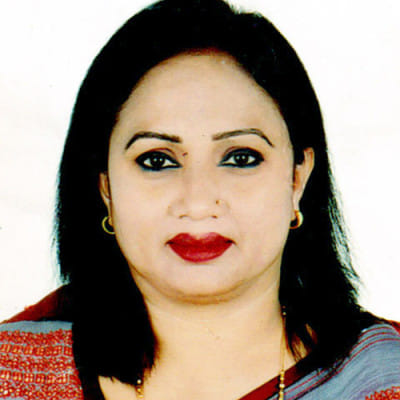
Dr. Salina Akhter, Secretary General, National Forum of Organizations Working with the Disabled (NFOWD)
The SDGs are one of Bangladesh's top priorities at the moment. However, if we do not include persons with disabilities in our economy, then we cannot successfully achieve the SDGs. I would recommend planning our future budgets and national plans with persons with disabilities in mind.
Our education system should also be made inclusive of persons with disabilities. Alongside formal education, persons with disabilities should also be provided with special education and training for their particular disability. All teachers who work with persons with disabilities should be able to use sign language. This type of special education and training would require an additional budget, and this should be incorporated into our upcoming National Budget.
Additionally, we need to pay attention to female persons with disabilities as they are currently lagging behind. The Ministry of Women and Child Affairs has many projects and training programmes for women. These programmes should be made accessible to female persons with disabilities.
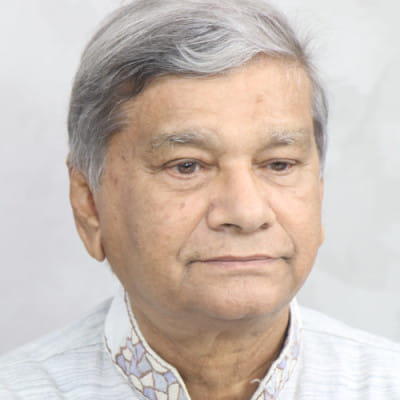
M.A. Mannan MP,
Honorable Minister, Ministry of Planning
The existing budget for persons with disabilities is inadequate. It amounts to only 0.375 percent of our total budget. Therefore, we need to ensure that the allocation for persons with disabilities is increased in the next budget. Support should be provided to those who are caregivers for persons with disabilities. If we can keep all these points in mind, we can establish a successful and sustainable budget, and I believe we will achieve it very soon.
While we are yet to include one percent of persons with disabilities in workplaces, we can see that many companies are eager to employ them. Many persons with disabilities are actively participating in the economy and they are doing so using their own capabilities.
When we originally established the allowance for persons with disabilities, there was not a lot of money in the budget. But we saw the sufferings of this community and tried our best to address their needs through this allowance. Now, the country is more well off economically. And so, we should increase the allowance for persons with disabilities, so that they not only survive, but also thrive.
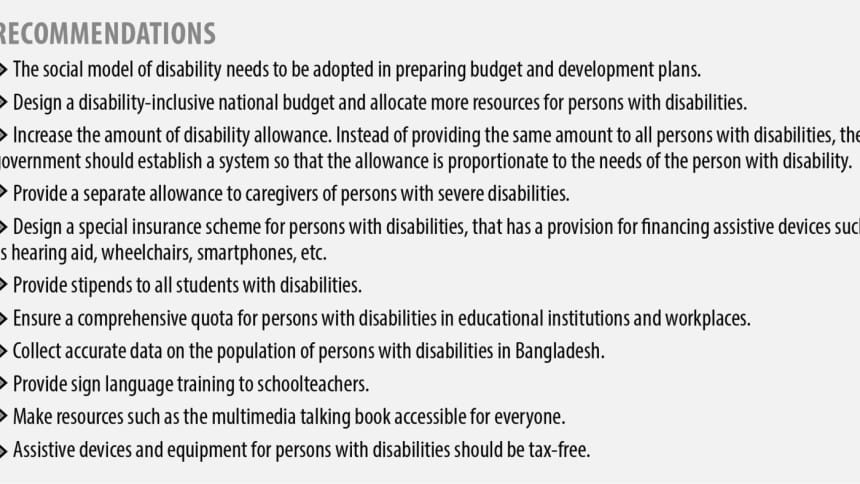

 For all latest news, follow The Daily Star's Google News channel.
For all latest news, follow The Daily Star's Google News channel. 


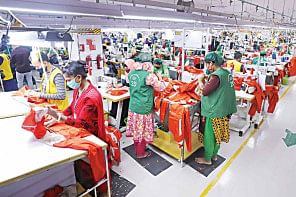
Comments